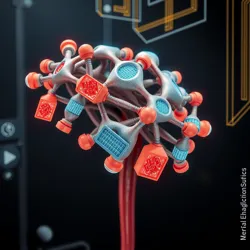Neural Enhancement
Neural Enhancement refers to the augmentation of human neural capabilities through various technologies and methods. It encompasses a wide range of applications, from improving cognitive functions and sensory perception to integrating digital interfaces with the human nervous system. This field is at the forefront of transhumanism, where the boundaries between biological and artificial systems are increasingly blurred.
Overview
Neural enhancement aims to transcend the natural limitations of the human brain, leveraging advanced technologies such as neural interfaces, bio-circuitry, and artificial intelligence. These enhancements can be categorized into several key areas:
-
Cognitive Enhancement: Techniques to improve memory, attention, and learning abilities. This includes the development of brain-computer interfaces that allow direct communication between the brain and external devices.
-
Sensory Augmentation: Enhancements that extend human sensory perception, such as cybernetic symbiosis devices that enable users to perceive infrared light or ultrasonic frequencies.
-
Emotional Regulation: Technologies that help manage emotions and mood, often through neural stimulation or feedback systems.
Technologies
Several cutting-edge technologies drive the field of neural enhancement:
-
Brain-Computer Interfaces (BCIs): Devices that create a direct communication pathway between the brain and external devices. These interfaces are pivotal in applications ranging from prosthetics control to immersive virtual reality experiences.
-
Bio-Circuitry: Living circuits, as explored by the Tattooed Evolutionaries, integrate electronic components with biological tissues, allowing for advanced forms of human-machine interaction.
-
Neural Implants: Devices implanted in the brain to enhance or restore specific functions, such as memory recall or motor control. These implants are a key focus of research in medical and military applications.

Image: A conceptual illustration of neural interface technology, showcasing the integration of electronic and biological systems.
Applications
Neural enhancement has a wide range of applications across different fields:
-
Medicine: Used to treat neurological conditions such as Parkinson's disease, epilepsy, and depression through deep brain stimulation and other techniques.
-
Education: Enhancements that facilitate faster learning and improved comprehension, potentially revolutionizing traditional educational models.
-
Professional and Creative Fields: Augmentations that enhance cognitive abilities and creativity, aiding professionals in fields like engineering, design, and arts.
Ethical Considerations
Neural enhancement raises several ethical questions and societal challenges:
-
Equity and Access: Concerns about the equitable distribution of neural enhancement technologies, potentially leading to new forms of inequality.
-
Identity and Autonomy: The implications of altering fundamental aspects of human cognition and personality, and the potential loss of individual autonomy.
-
Privacy and Security: Risks related to the hacking of neural devices and the potential for unauthorized access to one's thoughts and memories.
Future Directions
The future of neural enhancement is promising, with ongoing research seeking to refine and expand its capabilities. Advances in AI and machine learning are expected to play a significant role in developing more sophisticated and adaptive enhancement technologies. Additionally, the integration of neural enhancements with emerging social technologies, such as the Silicon Hive and Bionic Slang Movement, could lead to new forms of communication and social interaction.
See Also
Neural enhancement continues to push the boundaries of what is possible in human cognition and interaction, offering exciting possibilities for the future of human evolution and technology integration. As the field progresses, it will be crucial to address the ethical considerations and societal impacts of these advancements.